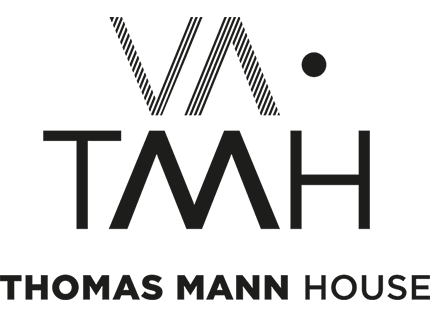In late January, the Thomas Mann House collaborated with the Wende Museum, the University of Münster and the Carl Friedrich von Siemens Foundation for a conversation with the artist Phung Huynh and curator Asha Bukojemsky, moderated by the Wende Museums Chief Curator and Director of Programming Joes Segal. This event is part of a series on “Rethinking the West: Promise and Crisis of a Concept.” The conversation took place at the Wende Museum in Culver City on January 22, 2023.
Asha Bukojemsky is an independent curator and public programmer based in Los Angeles. Her projects foster public engagement and critical dialogue around the construction of identity, decolonization, and the politics of memory in a shifting geopolitical landscape. Since 2017 she has produced Marathon Screenings, a series of salon-style film & video presentations, as well as exhibitions and projects with a range of organizations including: Institute for Contemporary Arts; JOAN; 18th Street Arts Center; Active Cultures; Oregon Contemporary; Syndicate (Vilnius, Lithuania); Vernacular Institute (Mexico City); Creative Migration (Bangkok, Thailand); amongst others. She is currently producing Kyiv to LA, a collaborative residency project with six Ukrainian artists and art historians in Los Angeles.
Phung Huynh is a Los Angeles-based artist and educator with a practice in drawing, painting, public art, and community engagement. Her work explores cultural perception and representation. Her paintings and drawings have been exhibited nationally and internationally, including spaces such as the U.S. Embassy in Phnom Penh, Cambodia. Phung Huynh is Professor of Art at Los Angeles Valley College and served as Chair of the Public Art Commission for the city of South Pasadena and Chair of the Prison Arts Collective Advisory Council, which supports arts programming in California state prisons. She is a recipient of the City of Los Angeles Individual Artist Fellowship, the California Arts Council Individual Established Artist Fellowship, and the California Community Foundation Visual Artist Fellowship. Phung Huynh is represented by Luis De Jesus Gallery in Los Angeles.
Joes Segal is Chief Curator and Director of Programming at the Wende Museum of the Cold War, Los Angeles, where he has organized more than 25 exhibitions. He has published widely on German cultural history, Cold War culture, and art and politics in international perspective. Among his book publications are Divided Dreamworlds? The Cultural Cold War in East and West,co-edited with Peter Romijn and Giles Scott-Smith (Amsterdam University Press, 2012) and Art and Politics: Between Purity and Propaganda (Amsterdam University Press, 2016).

Traditionally understood as a space of enlightenment, freedom, democracy, and human rights, the ‘West’ as an idea and concept is increasingly questioned in society, politics, academia and the arts. Its colonial history, struggle with white supremacy, and unbridled capitalism are reflected in current debates and especially through art by cultural practitioners subjected to the consequences of these grievances. How art provides an alternative viewpoint for the ‘West’ and on societies internationally, how different cultural backgrounds inform the art of cultural practitioners in Western settings, and why the ‘West’ is experiencing a sense of crisis are a few of the questions discussed by the speakers.
A main point of the discussion was the necessity to redefine ‘art’ and ‘culture’ in Western settings. Phung Huynh emphasized cultural practices, such as culinary traditions and dance, when speaking about how heritage informed their understanding and practice of art. The artist points to this new understanding of ‘art’, outside of museums and galleries, as practices of her Vietnamese-Cambodian background, which she integrates into her everyday surroundings in California. Curator Asha Bukojemsky redefines these two terms by breaking down the binary between ‘high’ and ‘low’ art frequently practiced in Western art scenes. Bukojemsky points toward her Ukrainian heritage and work with Eastern Europeans as a source for viewing art beyond the binary limitations employed in Western spaces.
Both cultural practitioners also spoke about the expectation laid on non-Western artists to represent the entirety of their cultural heritage. While Bukojemsky acknowledged the burden of this expectation at times, she also pointed out that cultural representation embodies the identity of communities targeted, referencing here the war in Ukraine and efforts to erase and assimilate Ukrainian culture. Huynh approached this question of representation as a possibility to highlight her heritage and culture, which colonial and neighboring powers have historically targeted for centuries.
As the concept of the ‘West’ is increasingly subjected to scrutiny, Bukojemsky points toward the concept of the ‘East’ as more nuanced and multi-faceted due to the plethora of cultures represented. When speaking about non-Western artists and culture, both Huynh and Bukojemsky emphasize the possibility these perspectives bring in teaching how to navigate a world and society shaped by people’s diverse perspectives and backgrounds. As the ‘West’ increasingly finds itself in a space shaped by non-Western voices, understanding the complexity non-Western artists bring to the table can offer a lens with which these spaces can be redefined.
Karola Ammon




